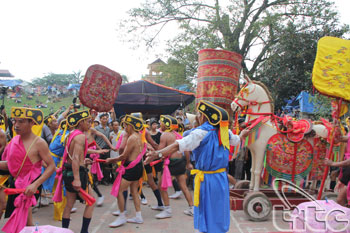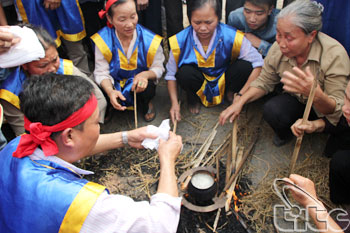According to the Ministry of Culture, Sports and Tourism, Vietnam has more than 8,000 festivals and spring festivals, many of which take place soon after the Lunar New Year. They are not only local historical and cultural legacies, but also the cultural beauty of Vietnamese communities and an important driving force for socio-economic development.
 |
|
Giong Festival
|
Typically, each Vietnamese village has a tutelary god - the god who reclaims the village land and brings peace to villagers, or the creator of a career for villagers. The festival commemorates the village god. Each village and locality has typical customs and practices. Though festival times are varied, they share the same significance of “remembering roots†and “remembering the village founder.†Many village festivals become emblematic and well-known like those of Hung Temple in Phu Tho province; Co Loa, Le Mat and Phu Dong in Hanoi City; Lieu Doi in Ha Nam province; Dong Ky, Lim, Dau and Ba Chua Kho in Bac Ninh province; Yen The, Xuong Giang, Tho Ha, Van Van in Bac Giang province; Co Trai in former Ha Tay province; Kiep Bac in Hai Duong province; and Chua Keo in Thai Binh province.
Most of village festivals open in the springtime when the Heaven and the Earth are in harmony and nature is in good condition. People whose ancestors are from the village normally return during the festival time, no matter where they are living or working. In the warm atmosphere, all happily join the festival to play, meet each other and pray for good jobs and happy life. Needless to say, village festivals bear profound community significance, which is illustrated by the culmination of harmony and unity for a common wish for village prosperity.
Like any other popular festivals of Vietnamese people, village festivals usually comprise two parts: Ritual ceremony and festivity. The ritual ceremony portrays admiration and reverence to the hero and honour of outstanding people, villager supporter, industry founder, and deity who bring prosperity and happiness to the community. Before the opening, communal houses, pagodas and temples and the village are cleaned. The rite is always dignified and compliant with service proceedings: Title proceeding, ceremonial music, ceremonial flags, fans and umbrellas, and drum beating. In many villages, these services are proceeded along main roads.
 |
|
Thi Cam Rice-cooking Contest
|
Co Trai Festival, open from the 8th to 11th day of the eighth lunar month in Co Trai village, Phu Xuyen district, Hanoi is imbued with Vietnamese spiritual culture. On the 7th and 8th day, pagoda keepers and the elderly hold a deity bathing ceremony. On the procession day, ritual participants are grouped into pairs. Leading the procession is the majestic dragon dance team moving in tune with drumbeats and castanet sounds. The other group is eight-sound team (flute, two-string violin, stringed instrument, horn, etc.) The service leader, usually the pagoda keeper, uses a drum to give command to the two teams. People walk one after another to the bank of the Luong River and witness the water-taking rite on the river. When the jar is filled with water, the service teams row to the bank and process to the pagoda. The water is used for monthly worship.
Tho Ha Festival in Tho Ha village, Van Ha commune, Viet Yen district, Bac Giang province is impressive with a solemn rite which takes 2 hours to complete a 300-metre distance. People also act out the characters of legend during the festival.
Unlike the ritual ceremony, the festivity is the display of dances, love singing, ceremonial singing, stage arts and physical, mental and skills contests (swimming in Dam village, human chess in Trieu Khuc village, wrestling, etc,) or folk contest (rice cooking in Thi Cam village, catching roach in water pot in Ho village, bonsai and cock fighting in Buoi village, chess playing in Mo Trach village (Hai Duong province), duet singing (Lim, Bac Ninh province).
The village festival is an opportunity to heighten the sense of preserving traditional values and take pride in a sacred past. Today, many localities invest to restore traditional values and festivals. These activities have actively contributed to construction and development of advanced, characteristic Vietnamese culture imbued with nationalism. Besides, unique characteristics of Vietnamese village festivals are an attractive tourism product for domestic and foreign tourists.